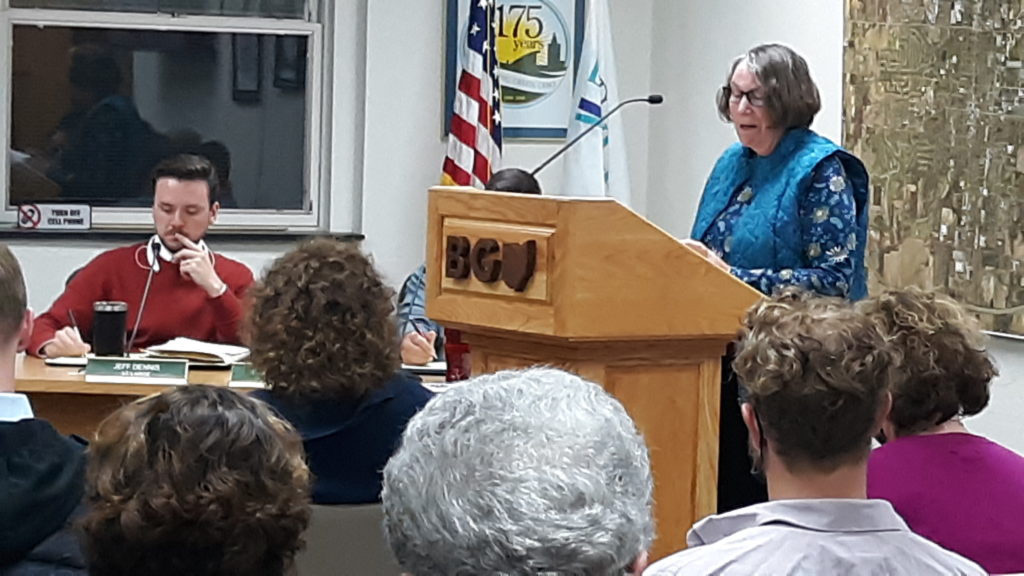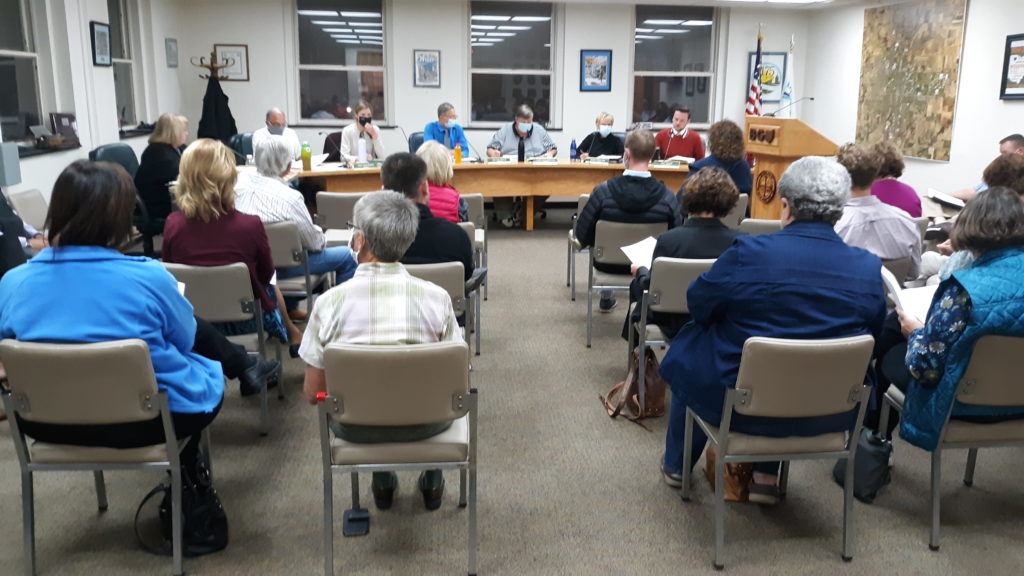By JAN LARSON McLAUGHLIN
BG Independent News
A rental housing ordinance 40 years in the making was approved by Bowling Green City Council Monday evening by a vote of 5-2.
Supporting the ordinance were Mark Hollenbaugh, Bill Herald, Rachel Phipps, Sandy Rowland and John Zanfardino. Opposing the ordinance were Jeff Dennis, who had pushed for more teeth in rental inspections, and Greg Robinette, who pushed against mandates on landlords.
The legislation will require the more than 7,200 rental housing units in Bowling Green to be registered with the city, have self-certification inspections by landlords, and allow the city to inspect rentals if a tenant reports that the self-inspection results are false.
City Council has made several attempts at a rental housing ordinance over the last four decades – with the knowledge that most other college communities in Ohio have such legislation in place. But inevitably, local efforts buckled when landlords voiced their opposition to any city mandates.
This time the landlords protested – but City Council passed the ordinance aimed at protecting tenants.
Prior to council voting Monday evening, the public was given a last opportunity to speak on the proposal. Some landlords made one last pitch to derail the legislation.
“I’m disappointed both professionally and personally,” said Steve Green, referring to the ordinance as an “overbearing, overreaching, time-consuming and costly law.”
The city has not proven the need for a rental housing registration and inspection program, he said.
“I’m not saying there aren’t some bad apples out there,” Green said. “This law will punish those of us who already do the right thing.”
Green said any effort to do random and mandatory inspections will open up the city to lawsuits.
“Defer to those warnings,” he advised council. “Set aside personal agendas and do what’s truly best for the city.”
Matt Bostdorff reached out to tenants, saying “You don’t need to live in an unrepaired house or apartment.” Tenants who face unsafe situations with housing should first submit requests to landlords for the work to be done, he said. If it’s not taken care of, then tenants should call the Wood County Health Department or Student Legal Services. In some cases, rent can be escrowed until repairs are made.
“Good landlords care,” Bostdorff said. “We want happy tenants who appreciate a good and safe home.”
The proposed ordinance would present an unnecessary burden on landlords, he said. The few properties that are problems should be dealt with using a scalpel. “You have chosen to toss in a hand grenade,” Bostdorff said.
Rick Metz, who has been a landlord in Bowling Green for 40 years, said he also has two rental homes in Oxford, which already has a rental inspection program in place. Metz said that process is onerous since it requires him to be present during the inspections.
Metz also cautioned council members that any costs to landlords will be passed on to tenants.
“The tenants do not want to pay any more rent,” he said, adding, “we need to be a welcoming community.”

Speaking on the other side of the issue was Jan Veitch, who questioned why rental housing problems continue to exist if the issue is so easily solved without an ordinance.
“I’m wondering why we have a problem with housing,” Veitch said. “Why haven’t those bad apples been taken care of. The landlords have an association – they have some power – and the city has power.”
Also speaking was Vassilki Leontis, whose husband, the late Neocles Leontis championed the cause of tenants who suffered with unsafe rental housing. She defended his work on the issue before he was elected to City Council, and then continued as a council member.
“The city council has an obligation,” Vassilki said.
She expressed disappointment that many of the tougher regulations initially discussed during 19 months of working on the ordinance were scrapped. The city administration weakened the ordinance by setting parameters allowing “no more bureaucracy” and no expense to the city, she said.
While some call the ordinance a “good start,” that implies that more will come. But historically, such efforts “only die in the hands of administration and city councils,” Vassiliki said.
Her husband fought hard for substantive changes for tenants, she said, asking that no one on council evoke his name during the deliberations.
“Do not defend your vote by saying Neocles would want this,” she said.
Council member John Zanfardino voiced his own reservations about the ordinance. He also shared his disappointment in the protests by local landlords.
“To hear the reaction to it, you’d think it was fairly draconian – and it is not,” Zanfardino said.
“It’s disappointingly weak, in my opinion,” he added. “I think it will have a minimal good impact on Bowling Green.”
The ordinance has far fewer teeth than those in most college communities, he said.
“This is way less intrusive than any other college town I know of in Ohio. We try to do what college towns do and we are being met with terrific resistance.”
Zanfardino rejected the claim by one of the landlords that East Side residents had inflated the problems.
“This is not a drummed up issue by the East Side Neighborhood Association,” he said, noting that multiple consultants recognized the quality of rental housing as a serious problem in Bowling Green.

Council member Sandy Rowland said the ordinance was not that imposing – and listed off the requirements of the legislation. It requires landlords to register their rental units, and do exterior and interior safety inspections themselves.
Copies of the completed inspection forms must be presented to the tenants and signed. Repairs must be made. And if the city learns from a tenant that the inspection form was not accurate, then the city can require a third-party inspection.
“This is truly the best we can do at this time,” Rowland said. “I am for getting this done now.”
Council member Bill Herald suggested an amendment to the ordinance that would require a certain number of audits be conducted each year to gauge the accuracy of the self-inspections.
Initially, he offered the number of 50 “to get a foot in the door and have audits,” he said. “One way to learn more is to have audits.”
However, council member Jeff Dennis reminded that city attorney Mike Marsh had said random inspections would be unconstitutional.
“Random searches without probable cause” would be challenged in court, Marsh said. “I think you jeopardize the whole thing.”
The city will conduct more inspections if it just reacts to tenant complaints, he said.
“This is unnecessary and unwise,” Marsh said of the amendment adding audits, which was then rejected.
Council member Rachel Phipps suggested an amendment requiring city staff to study the self-inspections, and set fees if necessary, that can then be run before council.
Council member Greg Robinette objected to the amendment saying the language was unnecessary, and had no value. But the majority of council approved the amendment.
Herald proposed an amendment giving landlords extra time if necessary for certain repairs, and adding language about the need for at least one tenant to sign the completed inspection forms – if the rental has occupants at the time. Both of those amendments were approved.
Before the vote was taken on the ordinance, Council President Mark Hollenbaugh talked about the 1989 ordinance he keeps on his desk as a “cautionary tale.” The controversial ordinance called for the end of grandfathered properties in 30 years. It was opposed by property owners who did not want to give up grandfathered status and by city residents who believed 30 years was too long to wait.
If that ordinance had passed, the issue of grandfathered properties would have been resolved two years ago, Hollenbaugh said.
“It’s important that we don’t miss opportunities,” he said. “That we don’t let the perceived perfect be the enemy of the good.”
After passage of the ordinance, Dennis explained his reasoning for voting “no.”
“When Neocles and I began working on this issue together almost three years ago, rental regulation was 100% unconstitutional and simply impossible for our community,” he said. “It’s notable how dramatically the window of possibility and the list of obstacles have shifted in just three short years. That’s progress.”
“Tonight’s self-inspection ordinance is not nothing,” he said. “That said, a self-inspection system that relies entirely on tenant complaints with no third-party audit requirement whatsoever is a long way from where we need to be, and a long way from where other Ohio communities already are. Our economic development goals are so inextricably linked to the quality of our housing and neighborhoods that we cannot afford to continue to lag in this area.”

